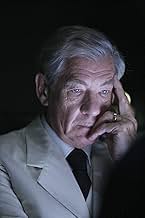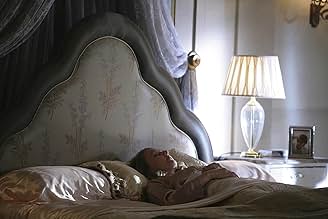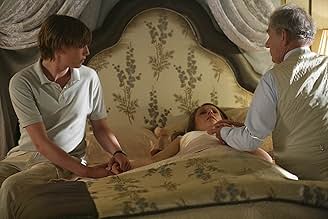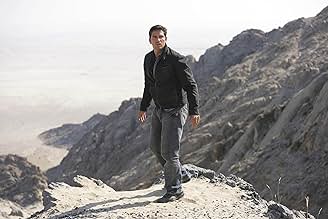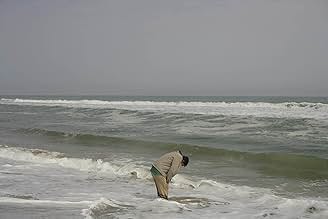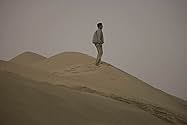The Prisoner
- Minissérie de televisão
- 2009
- 45 min
AVALIAÇÃO DA IMDb
6,1/10
8,2 mil
SUA AVALIAÇÃO
Uma atualização da série favorita dos cultos da década de 1960 sobre um agente do governo que é sequestrado e enviado para uma ilha remota conhecida como "The Village".Uma atualização da série favorita dos cultos da década de 1960 sobre um agente do governo que é sequestrado e enviado para uma ilha remota conhecida como "The Village".Uma atualização da série favorita dos cultos da década de 1960 sobre um agente do governo que é sequestrado e enviado para uma ilha remota conhecida como "The Village".
- Indicado para 2 Primetime Emmys
- 10 indicações no total
Explorar episódios
Avaliações em destaque
As a fan of the original Prisoner I can't begin to say how incredibly disappointed I am with this "remake". The "plot" is non-existent and makes no sense. It might be good if it had characters that made kept your interest in spite of the unintelligible plot line but sadly there isn't a single character that makes me care about what happens to them. In the original Patrick McGoohan was an excellent actor and portrayed an engaging character. The character of 6 in the original embodied the admirable quality of not giving up in spite of the odds. He was direct, smart and capable. In contrast, this 6 is a confused mamby-pamby guy with the personality of a doorstop. I am especially disappointed that one of my favorite actors, Ian McKellen would agree to appear in this mess. I think Patrick McGoohan is turning over in his grave.
This is a completely unique interpretation of The Prisoner (1967), so if you are expecting a remake, it will disappoint you. I was an avid viewer of the original. While it shares some imagery and key aspects, beyond that this is a standalone original TV series. Instead (and for some context), imagine what sort of world you live in now, and that someone kidnaps you and you wake up in a mythical village. The question then is why? These changes are not always bad things.
The narrative structure is except for the last episode, also different. The original had concrete narrative blocks, which meant each episode had some clarity. In this series there is no obvious individual narrative block in each episode, the plots run around semi-randomly, only pose questions and don't answer them. The last episode is ironically clearer than the original series, but still leaves the viewer with some sense of confusion. Also, this series only works if you watch it until the end. The dialogue is ok, occasionally very good, but often seems a little too contrived.
Many of the themes from the original series remain such as identity, individuality etc, but perhaps because of the more modern style feel lost or half hearted. There is too much going on, and as a result it lacks depth. This series is from 2009, with a different acting style to the 1960s. Back in those days, stage style acting often appeared on TV, and the original series was no exception to this. Sometimes this worked, other times it was just over the top. Fast forward to this version and the acting is more consistent and suited to the small screen. As ever, Ian McKellen does an excellent job. Jim Caviezel is 90% there. His acting sometimes shines, but it lacks the consistent, excellent performance that you get from McKellen. It feels like he just needs more rehearsal and an injection of some spontaneity now and again. Otherwise his performance and those of the supporting cast is consistent, good but lacks buzz. It feels unfair to compare everyone in The Prisoner to someone such as Ian McKellen, but you just can't help it. In reality, he just lacked a comparable sparring partner in this series.
Image is everything, and the sets and locations are as impressive as the original series. Perhaps more menacing is the sheer similarity of most houses except for the Palace of No. 2. This serves to make the feeling of forced conformity clearer. The design team did an excellent job, with one notable exception, The Clinic; it just feels lame in terms of interior and exterior. There are some occasional references to the original series.
Overall, this series is watchable. Not bad, but just not as good as it could have been. The writing and episode structures are just too confusing and will put many people off. This is a great pity, as its ending is no less clever than the original, only different. Try to get to the end and you will get some reward. This series just tries to hard which is why it doesn't quite make it.
The narrative structure is except for the last episode, also different. The original had concrete narrative blocks, which meant each episode had some clarity. In this series there is no obvious individual narrative block in each episode, the plots run around semi-randomly, only pose questions and don't answer them. The last episode is ironically clearer than the original series, but still leaves the viewer with some sense of confusion. Also, this series only works if you watch it until the end. The dialogue is ok, occasionally very good, but often seems a little too contrived.
Many of the themes from the original series remain such as identity, individuality etc, but perhaps because of the more modern style feel lost or half hearted. There is too much going on, and as a result it lacks depth. This series is from 2009, with a different acting style to the 1960s. Back in those days, stage style acting often appeared on TV, and the original series was no exception to this. Sometimes this worked, other times it was just over the top. Fast forward to this version and the acting is more consistent and suited to the small screen. As ever, Ian McKellen does an excellent job. Jim Caviezel is 90% there. His acting sometimes shines, but it lacks the consistent, excellent performance that you get from McKellen. It feels like he just needs more rehearsal and an injection of some spontaneity now and again. Otherwise his performance and those of the supporting cast is consistent, good but lacks buzz. It feels unfair to compare everyone in The Prisoner to someone such as Ian McKellen, but you just can't help it. In reality, he just lacked a comparable sparring partner in this series.
Image is everything, and the sets and locations are as impressive as the original series. Perhaps more menacing is the sheer similarity of most houses except for the Palace of No. 2. This serves to make the feeling of forced conformity clearer. The design team did an excellent job, with one notable exception, The Clinic; it just feels lame in terms of interior and exterior. There are some occasional references to the original series.
Overall, this series is watchable. Not bad, but just not as good as it could have been. The writing and episode structures are just too confusing and will put many people off. This is a great pity, as its ending is no less clever than the original, only different. Try to get to the end and you will get some reward. This series just tries to hard which is why it doesn't quite make it.
A man resigns from a mysterious agency. Soon, he finds himself in a place known only as "the Village" where nobody has a name but is a number where he's re-dubbed Six by its leader a man known only as Two. Resisting Two's attempts to break his mind with his insistence "I am not a number, I am a free man," Six begins trying to escape while trying to piece together what and where the Village really is. That, in short, is the premise of the six episode miniseries re-imaging of the classic 1967 Patrick McGoohan TV series The Prisoner. The Prisoner is an intriguing psychological thriller with sci-fi overtones.
The miniseries is anchored by a fine cast. Jim Caviezal plays Six, a man lost in a strange world and always on his guard against everyone and everything around him, who is a radically different character from the McGoohan version. His foe is Sir Ian McKellen as Two, the Big Brother like leader who seems benevolent yet is in fact a manipulative and cunning man who brings to mind memories of Leo Mckern in the original series. The villagers include Two's son 11-12 (Jamie Campbell Bower), the beautiful but mysterious doctor 313 (Ruth Wilson) and 4-15 (Hayley Atwell) who has some connection to Six's old life. Together they bring to life the assorted characters who occupy the Village.
By definition, this is a re-imaging of the original series. The biggest change being the focus is on the mind games between Six and Two, making this more of a psychological thriller then the original perhaps was. These include introducing the concept of the Village being the only thing in existence which does stretch creditability quite a bit. More successful are mind games such as in Harmony when Six is told he has brother for example. More successful perhaps is the setting for these mind games is an intriguing new version of the Village set in the middle of the desert. Like in the original, it is here that the sci-fi overtones to come in. With them the series explores issues such as electronic surveillance, mind control and the ability of an individual to resist conforming with society allowing for some intriguing social commentary along the way. Also intriguing is the clever playing with flashbacks to Six's previous life which are not be what they seem. Having said all that, things can be a bit too surreal and downright confusing at times so if you don't have a open mind and don't pick up clues as the miniseries goes on, things can (and will) be baffling. Overall, the re-imaging works splendidly.
There's homages to the original series as well. These include such things as the old man's costume at the beginning of episode one (the role was originally meant as a cameo for the late Patrick McGoohan) and the return of the mysterious balloon like guard Rover. Perhaps the biggest homage lie in the various episode titles which are all derived from original series including Arrival and Checkmate to name just two. This helps to remind the audience that, though this is at times a radical re-imagining of the series, the past hasn't been completely forgotten about.
By blending fine acting, mind games, an intriguing setting, homages to the original series, and clever playing with story-lines and ideas this version of The Prisoner becomes, while not a classic, an intriguing psychological thriller with sci-fi overtones. Are you interested? Then prepare to take a classic TV series in an intriguing new direction. But remember: "You only think you're free."
The miniseries is anchored by a fine cast. Jim Caviezal plays Six, a man lost in a strange world and always on his guard against everyone and everything around him, who is a radically different character from the McGoohan version. His foe is Sir Ian McKellen as Two, the Big Brother like leader who seems benevolent yet is in fact a manipulative and cunning man who brings to mind memories of Leo Mckern in the original series. The villagers include Two's son 11-12 (Jamie Campbell Bower), the beautiful but mysterious doctor 313 (Ruth Wilson) and 4-15 (Hayley Atwell) who has some connection to Six's old life. Together they bring to life the assorted characters who occupy the Village.
By definition, this is a re-imaging of the original series. The biggest change being the focus is on the mind games between Six and Two, making this more of a psychological thriller then the original perhaps was. These include introducing the concept of the Village being the only thing in existence which does stretch creditability quite a bit. More successful are mind games such as in Harmony when Six is told he has brother for example. More successful perhaps is the setting for these mind games is an intriguing new version of the Village set in the middle of the desert. Like in the original, it is here that the sci-fi overtones to come in. With them the series explores issues such as electronic surveillance, mind control and the ability of an individual to resist conforming with society allowing for some intriguing social commentary along the way. Also intriguing is the clever playing with flashbacks to Six's previous life which are not be what they seem. Having said all that, things can be a bit too surreal and downright confusing at times so if you don't have a open mind and don't pick up clues as the miniseries goes on, things can (and will) be baffling. Overall, the re-imaging works splendidly.
There's homages to the original series as well. These include such things as the old man's costume at the beginning of episode one (the role was originally meant as a cameo for the late Patrick McGoohan) and the return of the mysterious balloon like guard Rover. Perhaps the biggest homage lie in the various episode titles which are all derived from original series including Arrival and Checkmate to name just two. This helps to remind the audience that, though this is at times a radical re-imagining of the series, the past hasn't been completely forgotten about.
By blending fine acting, mind games, an intriguing setting, homages to the original series, and clever playing with story-lines and ideas this version of The Prisoner becomes, while not a classic, an intriguing psychological thriller with sci-fi overtones. Are you interested? Then prepare to take a classic TV series in an intriguing new direction. But remember: "You only think you're free."
Would anyone really want to see a verbatim remake of a 1960s TV series? C'mon people, spies? It's not the cold war. Let the new series explore themes of paranoia, subversion, and identity in a new, interesting, and CURRENT context. At the same time it's adding new mystery. Part of the fun is figuring out what's going on. I wouldn't want a replica mystery and therefore be spoiled. I applaud the update, its creepy, technically sound, and confusing as hell. Granted, the acting is not top notch, Caviezel is doing the best he can but can't carry it, although McKellen and Ruth Wilson are great. Is it perfect? No. But does it deserve 1-2/10 just because it doesn't mimic its predecesor? C'mon people stop living in the past.
Movie kept my interest. It separates from the original series in numerous ways. I would have preferred a closer match. That said, I thought the approach to this was still OK, and kudos to the actors who did a very nice job.
However, this remake failed with the ending of the movie. I won't spoil it. I believe the audience is left with just not believing the main character would act that way -- based on the story's own construction of the character. A story can take any twist, which is is fine, but if it makes a character act "out of character" one loses faith in the story. In this case, there is no justification for the ending based on what was seen. Unfortunate writing at the end.
However, this remake failed with the ending of the movie. I won't spoil it. I believe the audience is left with just not believing the main character would act that way -- based on the story's own construction of the character. A story can take any twist, which is is fine, but if it makes a character act "out of character" one loses faith in the story. In this case, there is no justification for the ending based on what was seen. Unfortunate writing at the end.
Você sabia?
- Curiosidades"Be seeing you" is a commonly-heard phrase in Palma Real (1967), this movie, and was also one of Patrick McGoohan's catchphrases in Danger Man (1960) and Danger Man (1964) . McGoohan's character "Johnny Cousin" (a pot-smoking drummer) in Noite Insana (1962) uses the phrase also when he says goodbye to the road manager "Berger" towards the end of the movie.
- ConexõesFeatured in A Six Hour Film Shot in 92 Days: The Diary of 'The Prisoner' (2010)
Principais escolhas
Faça login para avaliar e ver a lista de recomendações personalizadas
- How many seasons does The Prisoner have?Fornecido pela Alexa
Detalhes
- Data de lançamento
- País de origem
- Central de atendimento oficial
- Idioma
- Também conhecido como
- Ув'язнений
- Locações de filme
- Empresas de produção
- Consulte mais créditos da empresa na IMDbPro
- Tempo de duração
- 45 min
- Cor
- Proporção
- 1.78 : 1
Contribua para esta página
Sugerir uma alteração ou adicionar conteúdo ausente



